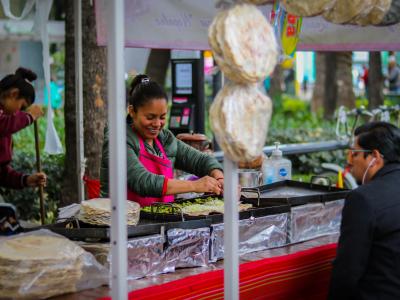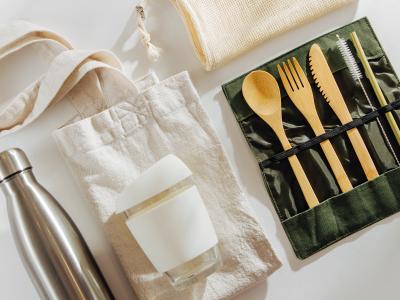


While mass-tourism is currently the norm, the way to encourage these AUTHENTIC experiences is by turning away from the westernized white-washed version of what the world should be – with fast food, constant around the clock digital entertainment and on-demand experiences. And instead to embrace what we are, human beings that have so much to learn from each other to build upon to make this world a better place.
- Kimberly Daley, President & CEO, MT Sobek
"Sustainable travel," is on everyone's lips lately. But what does that mean exactly, and, more importantly, what does it mean for you?
Sustainable travel takes into consideration the impact our travels have on the world – from the added carbon emissions caused by an increase in air travel to the effect over-tourism has on the welfare of the locals to the consequences travel has on conservation efforts.
While we certainly encourage travel, we at Houlahan Travel also want to encourage thoughtful travel practices that protect the wonderful destinations on our planet. So, how can you travel sustainably? Here are a few ways you can help ease the impact on our planet while still enjoying the enormous benefits of traveling:
Slow Down and Enjoy the Ride
Given how scarce vacation time is, it’s easy to get caught up in the idea of jumping between countries and destinations to cover as much territory as possible in the limited time you have. How many times have you thought, “if we are going to travel 9, 10, 15 hours by plane we might as well see every country in the area.” But flying between multiple destinations is taxing and by immersing yourself in the destination you will get a deeper sense of the place while also decreasing your carbon footprint.
If you still want to take in the surrounding destinations, train travel is a good way to do this. Some amazing travel-by-train destinations include Europe, India, Southeast Asia, East Africa, and the US.
But if train travel isn’t your thing or the destination doesn’t lend itself to riding the rails, you can still offset your carbon footprint. According to frequent flier, The Points Guy, who has to fly for a living and, thus, can’t always travel sustainably, paying for carbon offsets is a way to help. “The money you spend effectively offsets your carbon emissions by supporting projects that produce clean energy or reduce carbon emissions in other ways.”
Rethink your Bucket List
According to Kimberly Daley, President & CEO of MT Sobek Travel, a leader in adventure travel, it isn't enough to wait until the crowds leave to visit a destination. In order to combat overtourism people need to look to other destinations. "It's crucial that we rethink our bucket list," Daley said. "Machu Picchu is a prime example [as is the Great Wall of China and Mount Everest]. This type of overcrowding is everywhere." Many times, she notes, it's not possible to find a different time to visit a particular destination because of school and work schedules so you need to look to other options.
Donate with a Purpose
If you are looking for a meaningful way to contribute to the locals in a destination you are visiting, look for a reputable local organization or an international group that partners with them to donate to a social welfare project. Many well-meaning travelers pack their suitcases with items to donate to locals in developing countries but end up packing items that aren’t good for anyone in the community.
National Geographic recommends Pack for a Purpose, an international organization that identifies specific needs in destinations around the world and connects travelers who want to use a small amount of space of their luggage to pack supplies needed by communities in developing countries.
Just Say No To Plastics
The majority of marine debris is made up of plastic, which do not biodegrade but instead break down into smaller pieces. These smaller pieces are often mistaken for food by birds and marine life leading to starvation or internal organ damage upon consumption. Single-use plastics are being banned in more and more destinations - from hotels to cruise ships to entire cities - but travelers can also help.
-
Pack a refillable water bottle, or if you are traveling to an area where water is not safe to drink, pack a portable water filter.
-
Say no to plastic straws, utensils and bags. Instead carry reusable straw or opt for paper; pack your own reusable utensils and pack a tote in your luggage to use as you peruse the street markets and shops
-
Don't use single use shampoo bottles - bring your own in a reusable bottle.
-
Use bio-degradable wet wipes
-
Clean up after yourself - don't leave trash behind (and if you are so inclined pick up some discarded plastic left by someone else and toss it out).
Buy Local - Travel with Locals
- Eat in a locally owned restaurant at least once during your stay. Local cuisine is so much more than just sustenance - it's the history of a location.
- Buy souvenirs made by locals. Beware of imitations. Skip the tourist stops where you will likely find mass-produced copies of local products. Local crafts may be slightly more expensive but do you really want to bring back beads from Belize with a "Made in China" tag. Seek out the artisans who are making the handicrafts to learn about their craft and their process. That souvenir is a lot more interesting when you know the story behind it.
- Seek out local guides and experiences. "Put tourism dollars squarely in the hands of the people you're visiting," Daley suggests. "...let them become part of the conversation, leading it in fact"
Never Buy Wildlife Products
Ever. By buying shells, hides, products made from animal tusks and horns you are supporting the market for endangered wildlife products. Don't do it.